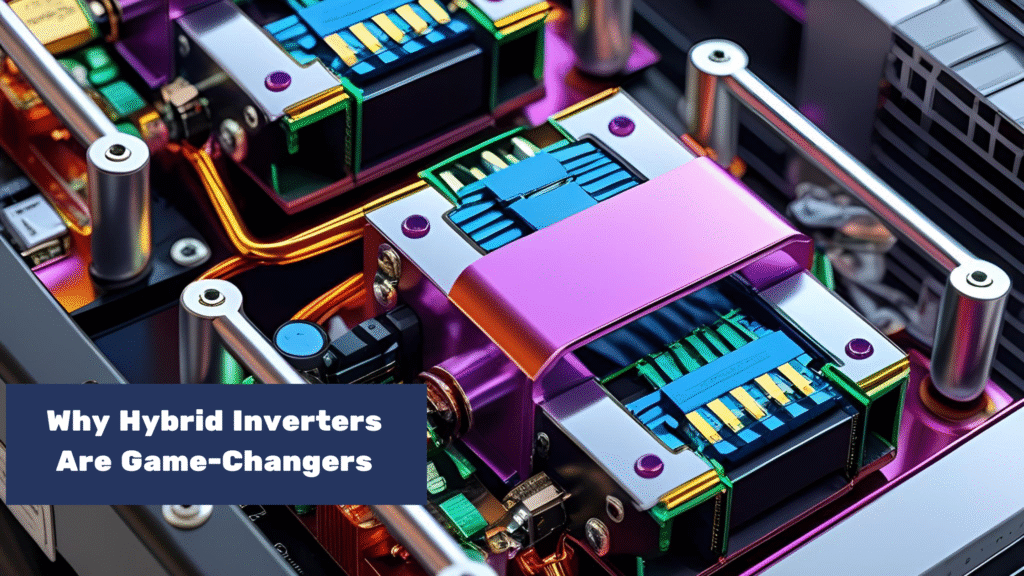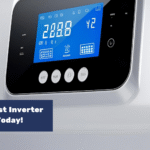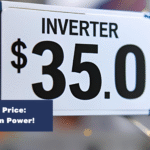Tired of Choosing Between Grid and Solar Power?
What if you didn’t have to?
Power disruptions are a daily concern for millions of homes and businesses. Whether you’re dealing with erratic grid supply, fuel price hikes, or rising energy bills, the pressure to find a smarter solution is growing fast.
That’s where hybrid inverters come in.
This guide shows you why hybrid inverters are becoming the go-to choice for homeowners and businesses—and how to decide if one is right for you.
What You’ll Learn
- What makes a hybrid inverter different
- How hybrid inverters work
- Key benefits for your home or office
- What to consider before buying one
- Real-world pricing examples
- Tips to get the best value on your purchase
What Is a Hybrid Inverter?
A hybrid inverter combines the functions of a solar inverter and a battery inverter.
It manages power from multiple sources—solar panels, batteries, and the utility grid—all in one unit.
It does three jobs at once:
- Converts DC power from solar panels to AC for household use
- Stores excess solar energy in batteries
- Pulls grid power only when needed
That flexibility is what makes them different from traditional inverters.
Why Are Hybrid Inverters Getting So Much Attention?
People want energy independence.
The cost of solar systems is falling.
Batteries are more accessible.
Grid reliability is inconsistent.
Hybrid inverters bring all these elements together into one system—seamlessly.
Key Benefits of Hybrid Inverters
- Automatic Power Switching
Switch between solar, battery, and grid power without lifting a finger.
Perfect for areas with unstable supply. - Lower Energy Bills
Use stored solar energy during peak-rate hours.
Save on electricity costs over time. - Backup During Outages
Keep essential appliances running—even when the grid is down.
No more blackouts ruining your day. - Battery Integration
Add a battery now or later.
Hybrid inverters work with both lead-acid and lithium batteries. - Solar-Ready
Already have solar panels?
A hybrid inverter can start using them immediately.
Who Needs a Hybrid Inverter?
Ask yourself:
- Do I face frequent power cuts?
- Am I planning to go solar now or in the future?
- Do I want to save on long-term electricity costs?
- Is energy security important for my home or business?
If your answer is yes to any of these, a hybrid inverter deserves a closer look.
Use Cases That Make Sense
Homeowners
Keep your fridge, router, and lights running during blackouts.
Remote Locations
Access to stable grid power is rare. Solar + battery + hybrid inverter gives you control.
Shops and Small Offices
Reduce fuel costs and noise from generators.
Schools and Clinics
Stable power is non-negotiable. Hybrid setups offer reliability and quiet operation.
Real-World Example: Cost Breakdown
Let’s take a sample setup for a 3-bedroom home:
| Component | Details | Price Range (USD) |
| Hybrid Inverter | 5kVA, solar-ready | $600 – $850 |
| Lithium Battery | 48V, 5kWh | $1000 – $1500 |
| Solar Panels | 6–8 panels, 2kW – 3kW | $1000 – $1800 |
| Installation & Misc | Wiring, safety gear, labor | $300 – $500 |
This setup powers lighting, fans, fridge, internet, TV, and charging ports—all day.
You reduce your grid reliance to nearly zero during the day and use batteries at night.
Key Features to Look For
Battery Compatibility
Make sure it supports both lithium and lead-acid.
AC and DC Input Ports
You’ll want both for solar and grid access.
Real-Time Monitoring
Many hybrid inverters offer mobile apps to track usage.
Built-in MPPT Charge Controller
Improves solar efficiency and protects your system.
Warranty
Minimum of 2 years. Some brands offer up to 5 years.
What to Avoid
Cheap Imitations
Unknown brands with no support history may fail under real load.
Low Voltage Models
Choose an inverter that can handle your future expansion needs.
Units Without After-Sales Support
Buy from companies that provide local repair or parts access.
Where to Buy a Hybrid Inverter
Top Online Stores
- Amazon
- Home Depot
- EcoFlow
- Inverter.com
Trusted Brands
- Growatt
- Victron Energy
- Schneider Electric
- Solis
- Luminous
Compare prices, read customer reviews, and always check the return policy.
Expert Buying Tips
- Measure your load requirements before choosing capacity
- Check if the inverter is compatible with your region’s voltage and grid standards
- Consider future upgrades (solar or battery expansion)
- Choose a model with remote monitoring
- Read at least 3 user reviews before committing
Think Long-Term
Buying a hybrid inverter isn’t just about today’s savings.
It’s about future-proofing your energy setup.
You gain control, flexibility, and cost stability in a single move.
Ready to Make the Switch?
Your energy future doesn’t have to depend on unstable grids or noisy generators.
You can generate, store, and manage your own power—all in one place.
And you don’t have to wait for the perfect solar system or a big budget.
Hybrid inverters make smart energy decisions possible—starting now.



